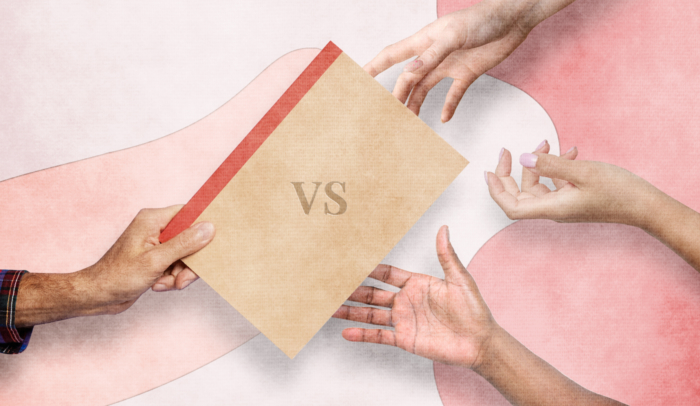“Should I self-publish or traditionally publish? Which is the better publishing option right now?”
This is one of the most common questions we get at Scribe.
The problem with this question is the answer can be very complex. There are so many different factors that could possibly come into play, and the answers are not always cut and dry.
But…it’s only complicated for about 2% of authors.
For 97% of authors, the answer is very clear: self-publishing is the right choice.
For the other 1% of authors, the answer is very clear in the other direction: traditional publishing is the better choice.
This post is for that 98% of authors who should clearly go one way or the other, and is designed to help you easily and quickly understand which side you are on.
This post is not written for the 2% of authors who need a long, complicated explanation. For those authors, I wrote another post that really dives deep into the complicated details.
What Is the Difference Between Self-Publishing and Traditional Publishing?
There is only ONE key difference:
If the author owns the rights and royalties, then the book is self-published.
If the publishing company owns the rights and royalties, then the book is traditionally published.
That is it. Everything else is commentary on that single distinction.
Who Should Traditionally Publish?
First off, it’s VERY hard to get an offer to publish through traditional publishers (why that’s so is covered here).
But if you can get an offer, and an advance of $500k or more from the publisher, you should (almost certainly) take the deal.
These are mainly the types of people who can get those deals:
- Big Celebrities
- Famous Athletes
- A-List Actors
- Politicians
- Household name CEOs
- Professional Writers (novelists, etc.) with a long history of high sales
- People with deep connections in the publishing industry
What if you can get a deal with a traditional publishing company, but the advance will be less than $500k? Then it depends. That’s part of the 2% who have a complicated answer, and that is addressed here.
Who Should Self-Publish?
Just about everyone else:
- Business owners
- Consultants
- Entrepreneurs
- Business people
- C-level executives
- Financial planners
- Lawyers
- Doctors
- Coaches
- First-time Authors
- Anyone else who just wants to write their book
Why is this?
Why should everyone else self-publish?
Because without a big advance from a major publisher, the advantages of self-publishing greatly outweigh the disadvantages.
What Are the Advantages and Disadvantages?
Self-Publishing
| Advantages | Disadvantages |
|---|---|
| Self-published authors have full ownership of rights and royalties | You must make sure the book is good in all aspects. If it’s unprofessional in any way (writing, cover, marketing, etc.), it will make you look bad. |
| Completely customizable in all aspects | It’s time consuming to learn and manage the process yourself. |
| Fast to market (6 months) | If you hire excellent professionals to help you, it’s expensive. |
| Complete control of marketing | There’s either a lot of work, or a lot of money, to get it right. |
| Complete creative control | |
| Complete freedom, no gatekeepers telling you what you can and cannot do | |
| Self published books have a significantly higher profit potential | |
| Can do niche books (which are a huge advantage for most authors, explained here: https://scribemedia.com/target-book-audience/) |
Traditional Publishing
| Advantages | Disadvantages |
|---|---|
| Monetary advance prior to publishing (no up-front cost) | Nearly impossible to get a deal (less than 1 percent of proposals are accepted) |
| Publisher invests the money to publish the book (and they usually can ensure professionalism) | Huge time investment (the traditional publishing process is overly complex) |
| Highest potential for traditional media coverage | Very slow to market (2+ years) |
| Highest chance of print distribution in bookstores | No ownership of your manuscript rights |
| Sends signal of validation (to some people) | No marketing control |
| No creative control | |
| Limited financial upside | |
| Won’t do niche books |
Self-Publishing vs Traditional Decision Tree
Question 1: Can you get a traditional publishing deal?
If you can get a deal, go to question 2.
If not, then self-publish.
If you’re unsure whether you can get a deal or not, read this article. It explains what you need to have to be able to traditionally publish (basically you must have an audience of least 25k+ people waiting to buy your book specifically).
Question 2: If you can get a traditional publishing deal, should you take it?
What do you value most?
If the answer is status, go traditional.
If the answer is validation, go traditional.
If the answer is quick money, go traditional.
If the answer is long term wealth, self-publish.
If the answer is freedom, self-publish.
If the answer is creativity, self-publish.
If the answer is making an impact, self-publish.
Conclusion: Self-Publishing is probably the right answer (97+% of the time)
Like almost all things in life, when you take out the weird fringe exceptions, it becomes pretty clear and easy to understand.
97% of authors should clearly self-publish.
1% of authors should traditionally publish.
The other 2% should take a lot of time and effort and really dive into the details so they can make a hard decision.
I hope this helps. If not, email me and I’ll see what I can do to make it clearer: tucker[at]scribemedia.com.


